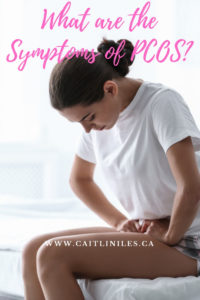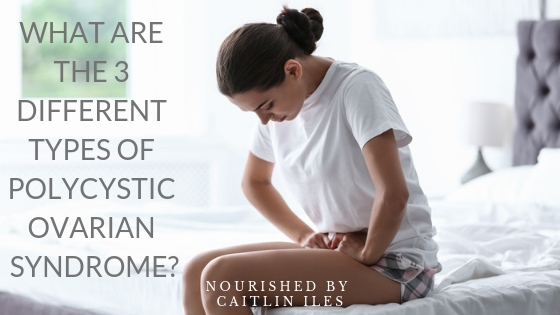Hello friend! This post is a long one, so I’m going to hop right in! Today we’re looking at the 3 different types of PCOS and the potential contributing factors to each. If you haven’t read Part 1: Intro to PCOS then make sure you head over and check it out before continuing!
There is definitely some overlap in the symptoms and/or causes, which is why it is so important to educate yourself on the different types of hormones at play so that you can compare them with your lifestyle and come up with the most likely cause in your case.
I always recommend working with your doctor or another qualified health care practitioner when it comes to figuring out the best approach to healing. So without further, ado let’s dive in!
As mentioned in the first part of this series, Stefani Ruper states in her book PCOS Unlocked: The Manual, that the medical profession is predisposed to treat PCOS as a condition with one cause and one effect due to the majority of the folks presenting the same hormone profile (11).
However, she states that there are three major causes of PCOS that may influence one another and which necessitate an individualized approach to treatment, much like I do with my clients!
What Are The 3 Types of PCOS?
Type 1:
Caused by insulin resistance. This type is the focus of the medical community and may consist of 60-75% of the total PCOS population (Ruper 11).
- Indicators of Type 1 PCOS:
- Being overweight, specifically in the abdomen.
- Difficulty losing weight.
- Acne
- Hair growth—face, thickening of hair on arms, legs, abdomen, and back.
- Hair loss—thinning or loss on the top of the head.
- Irregular menstruation.
- Blood Markers:
- Elevated testosterone
- LH:FSH ratio higher than 1:1
- Poor insulin sensitivity, glucose tolerance, or fasting glucose (Ruper 17).
Type 2:
Caused by metabolic, physical, or psychological stress, which affects the HPA (hypothalamus-pituitary-adrenal) axis and leads to disregulation of hormonal balance. It is thought that this type affects approximately 25% of the PCOS population (Ruper 11).
Usually “these phenomena lead to the menstrual disorder hypothalamic amenorrhea[, but] in some [folks] cystic ovaries develop, giving them PCOS instead” (Ruper 24).
The biochemical nature of these folks’ stress responses combined with a degree of metabolic damage, such as insulin resistance, which they have accrued in the past “is what combines with hypothalamic amenorrhea and PCOS in this specific population” (Ruper 24) of PCOS sufferers.
- Indicators of Type 2 PCOS:
- Drastic weight loss (>~20 pounds)
- Weight loss below level of body fat during puberty
- Daily exercise.
- Obsessions with exercise and/or body image
- Low body fat
- Extreme stress
- Poor sleep
- Blood Markers:
- Low LH and FSH
- Low estrogen
- Possibly high cortisol
- Possibly high DHEA-S
- Higher than average testosterone
- Low prolactin
Type 3:
Occurs in conjunction with hypothyroid conditions in folks with ovaries and can have significant overlap with the other two types of PCOS.
Causes of decreased thyroid function include: calorie restricted diet, severe carbohydrate restriction, stress, and Hashimoto’s thyroiditis (Ruper 33), an autoimmune condition where the body attacks the thyroid gland.
- Indicators of Type 3 PCOS (in addition to classic Type 1 PCOS symptoms above):
- Fatigue
- Difficulty losing weight
- Cold hands and feet
- Hoarse voice
- Digestive issues
- Blood Markers:
- Low or high TSH
- High T4
- Low T3
- High reverse T3
- Hashimoto’s thyroiditis anti-bodies.
Due to the varying causes of PCOS, Ruper (13) recommends that individuals who suspect they have the condition should have the following hormones tested, depending on which type they believe they have:
- Testosterone
- Estradiol
- Estrone
- DHEA-S (Type 2)
- Progesterone
- Prolactin
- Luteinizing home (LH)
- Follicle stimulating hormone (FSH)
- Thyroid-stimulating hormone (TSH) (Type 3)
- T3 (Type 3)
- T4 (Type 3)
- Reverse T3 (Type 3)
- Hashimoto’s anti-bodies (Type 3)
- Cortisol (Type 2)
- Fasting blood glucose and insulin levels
- Glucose tolerance test
What are the Contributing Causes of PCOS?
Type 1 Contributing Causes:
The major cause of this type of PCOS is diet-related as it is most commonly associated with excessive carbohydrate or sugar intake leading to hyper-insulinemia, an excessive production of insulin, or impaired glucose metabolism (Vanderhaeghe 105).
Approximately 60% of PCOS patients are overweight and insulin resistant, but some may be of normal weight and still be somewhat insulin resistant (Ruper 14). Insulin resistance is characterized by the inability of the fat cell to recognize the request of insulin to shuttle glucose into the fat cells due to an overabundance of sugar and insulin in the blood stream.
Too many calories, sweets, and toxic foods typically found in the Standard American Diet break the body’s metabolism and cause insulin signalling mechanisms to start having problems (Ruper 22).
High levels of insulin directly stimulate the ovaries to produce testosterone (Ruper 22). The following imbalance between the testosterone/estrogen/progesterone sex hormones in the body prevents proper communication between the ovaries and the pituitary gland causing irregular menstrual cycles (Ruper 22).
Exciting Causes:
Another contributing cause of high insulin in the blood is stress. Stress causes the adrenal glands to release cortisol, a hormone which stimulates the release of sugar into the blood stream in order to help the body deal with the perceived stressor (Jensen 19).
The increase in blood sugar levels puts extra strain on the pancreas to produce more insulin to deal with the increase. As more insulin is secreted the cells become resistant to it and require more insulin to shuttle the glucose into the cells (Jensen 19). Systemic inflammation is also a contributing cause of insulin resistance (Ruper 17).
Predisposing Causes:
There is a genetic or hereditary component to PCOS, in that 20% of mothers and 40% of sisters of individuals diagnosed with the condition exhibit some of the symptoms themselves (Vanderhaeghe 104).
As such, folks with ovaries who have family members diagnosed with PCOS should follow the appropriate diet and lifestyle recommendations that I will be highlighting in more detail in future posts, but which include: Low GI diet, appropriate stress management, physical activity, support of adrenals or thyroid if they are of concern, and weight management.
Type 2 Contributory Causes:
In this type of PCOS diet may play a role due to the lack of nutrients being consumed, excessive fasting, or chronic restriction of a specific macronutrient (Ruper 24).
The role diet plays in Type 2 PCOS is more due to the stress response elicited by the chronic restrictions these folks may be placing themselves under to maintain or achieve a desirable body weight.
This type of PCOS is less common and so is also less studied than Type 1, so often underweight patients may be told by doctors that in order to treat their condition they have to lose weight (Ruper 15), a strategy that, for obvious reasons, is unlikely to be beneficial to them.
The starvation response in the body that is caused by food restriction or excessive exercise leads decreased pituitary activity, causing low sex hormone levels (FSH, LH, prolactin, estrogen, and progesterone) and testosterone levels that are relatively higher than these hormones (Ruper 25).
Exciting Causes:
The major cause of this type of PCOS is attributed to the stress response in the body caused by either emotional, physical, psychological, or metabolic stress.
As mentioned above calorie, micro- or macro-nutrient restriction may be a significant causative factor in the development of PCOS. Fat cells secrete estrogen, so when a person loses an excessive amount of weight their estrogen levels drop signalling the hypothalamus that energy stores are too low to support fertility (Ruper 28-9).
This signal will typically only happen if a person’s estrogen drops below their “set point,” which is dependent on each individual’s development, size, and hormone environment throughout puberty (Ruper 29).
Normal, healthy weight loss done slowly and taken only to a healthy degree of body fat loss will not cause this stress response in the hypothalamus.
Fatigue and stress caused by the dietary restrictions above, excessive exercise, or high levels of psychological stress can overstress the hypothalamus and lead to the depression of hormones mentioned above, amenorrhea, and the development of cystic ovaries if testosterone levels remain relatively high (Ruper 26-7).
Folks who are psychologically stressed out typically present with high adrenal function leading to high DHEA-S and testosterone output, and low pituitary function, which leads to a lowering of the other sex hormones outlined above (Ruper 30).
Stress turns off pituitary activity via the hypothalamus, leading to a decrease in FSH and LH, which in turn decreased estrogen and progesterone (Ruper 30).
Increased adrenal function may cause an increased production of cortisol, which, as was mentioned above, increases blood sugar and insulin levels.
DHEA-S production can also be increased if the adrenals are hyperactive. This overproduction may be a problem because this hormone is classically an androgenic sex hormone and it plays a similar role to testosterone in PCOS (Ruper 30). In excess it: blocks estrogen signalling, interferes with LH and FSH signalling, and increases hormonal acne (Ruper 30).
Type 3 Contributory Causes:
Severely limited carbohydrate intake or calorie restricted diets can cause hypothyroidism because low intake/restricted calorie diets cause the thyroid to respond by slowing down its function to preserve energy throughout the body.
Low carbohydrate diets can also impair the conversion of T4 to T3 in the liver because glucose is required for this action to take place (Ruper 36).
If Hashimoto’s thyroiditis is suspected, gut health should be assessed and food allergies determined, as they often play a role in autoimmune conditions.
Exciting Causes:
Poor sleep, inflammation, and stress also cause decreased thyroid function and can lead to type 3 PCOS. As mentioned above, it is often seen in conjunction with either type 1 or type 2 PCOS.
- Stress/poor sleep causes an increase in cortisol, which interferes with the conversion of T4 to T3 (Ruper 36).
- Inflammation, likely from the ingestion of inflammatory foods such as sugar, high omega-6 intake, and refined grains, also causes decreased thyroid function (Ruper 36).
So there you have it friend. Another deep dive into the world of Polycystic Ovarian Syndrome.
These different categories of PCOS aren’t always fully recognized in the medical community, which is why it is so important for you to be educated on your hormones, your stress levels, and your risk factors so that you can take an active role in your healing process.
A great way to start balancing your hormones is via an anti-inflammatory diet, so I’ve put together a FREE 7-Day Anti-Inflammatory Meal Plan & Shopping List that you can download right here.
As always, thank you so much for your love and support! If you’re looking for some support in balancing your hormones feel free to take a peak at my coaching packages.
Cait xo

What Are Symptoms of PCOS_




Trackbacks/Pingbacks